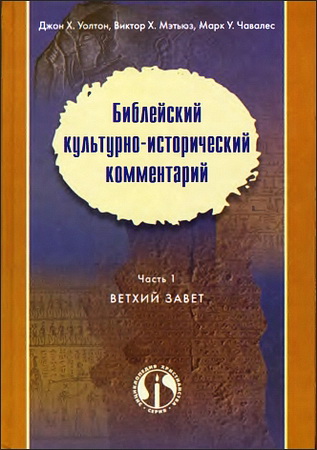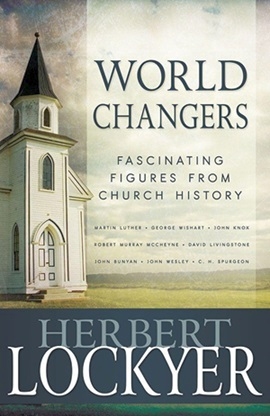
Lockyer - World Changers - Fascinating Figures From Church History - модуль BibleQuote
Herbert Lockyer - World Changers - Fascinating Figures From Church History
New Kensington, PA: Whitaker House, 2013. – 144 p.
ISBN: 978-1-60374-638-0
eBook ISBN: 978-1-60374-687-8
Biographical reading and study is both fascinating and faithful, and church history is replete with the lives and deeds of saints—true knights—who fought under the banner of the Lord they loved. Many of them were men and women of action, as well as of vision. It mattered little to them where they pitched their tent, as long as they could serve Him to whom they owed so much. Stirring deeds and extraordinary accomplishments embroidered their lives and now kindle in our hearts the desire to emulate their faith, their sanctity, and their courage. Their imperishable record reminds us that we, too, can “make our lives sublime.” Meditating upon the character and magnificent labors of great lives crowding the roll of church history, we are impressed with the fact of Christ as a living and working power in the life of man; and that what He did for and with them He can still accomplish through us. Robert Browning, in “One Word More,” reminds us,
Other heights in other lives, God willing:
All the gifts from all the heights, your own, Love!
The biographies we have selected are of men who were outstanding and strategic witnesses for Christ in their own times, and who not only molded the thought and directed the action of the age in which they lived but who today, though dead, still speak.
At the burial of Caesar, Shakespeare makes Cassius say:
The evil that men do lives after them,
The good is oft interred with their bones.
While this sentiment is true of a great many who live without God, it is not applicable to the vast majority of church saints. Certainly they had their faults and made mistakes, for they were very human. But dominating their lives was the passion to serve God in a needy world, and, although hardy adventurers on the sea of life, buffeted and beset by violent storms, they came safely to port with rich cargoes. Their good was not interred with their bones. Their stories still thrill our hearts and create within us a desire to follow them as they followed God.
* * *
Wesley, John
The Evangelist Who Prevented a Bloody Revolution
Lecky, the historian who affirmed that “the conversion of John Wesley formed one of the grand epochs of English history,” is the one who tells us that the Methodist revival saved England a terrible revolution, which, at that time, had engulfed France and seemed ready to sweep across the Channel to bring a bloodbath to England. But the mighty spiritual revival under George Whitefield and the Wesleys caused the tide to turn through the remarkable outburst of practical Christianity. More than any other man since that sixteenth century, John Wesley stands out as the most outstanding religious leader who influenced the masses for God and righteousness.
John Wesley was born in one of the darkest periods of English history. Appalling conditions made the country ripe for a revolution. There was the iniquitous slave traffic. Prisons were dens of cruelty and the foulest immorality, from which prisoners could escape only by starvation or by jail fever that festered without ceasing in those haunts of human wretchedness. Purity and fidelity to the marriage vow were sneered at, considered out of fashion. Schools were scarce, crowds of children being denied moral or religious training of any sort. Mobs rioted, burned houses, flung open prisons, and robbed homes and ships at will. Ruthless laws, like the one that ruled a person should be hanged for cutting down a tree or for thieving, only caused the criminal class to become more bold and prolific. In higher circles, anyone who talked of religion was laughed at.
Hannah More, the English religious writer and reformer, reported, “We saw but one Bible in the parish of Cheddar and that was used to prop up a flowerpot.” Drunkenness also prevailed, for people could get drunk for a penny. It was a time of open profanity. “The Blasters Club,” made up of youths who professed to be servants of the devil, came together to offer prayers in his name. Such utter disregard for sacred things had never been known in England before. At one time, Wesley visited the low quarter of Newcastle-upon-Tyne, where he stood by the old pump and preached the gospel. His text was Isaiah 53:5: “He was wounded for our transgressions, he was bruised for our iniquities.” One who was present said afterward that “Wesley’s tenderness was such that these poor and wicked people clung to his hands and his clothes when he had finished.” But Wesley himself said of the crowd, “Such blasphemy, such cursing, such swearing, even from the mouths of little children! Surely this place is ripe for the Master.”
Such were the bad old days Wesley was born in, and God made him the channel of a spiritual revolution that helped to change society, the fruit of which abides in religious and philanthropic agencies. As Woodrow Wilson, twenty-eighth president of the United States (1913–1921), wrote, “The 18th century cried out for deliverance and light, and God prepared John Wesley to show the world the might and blessing of His salvation.” As we think of the corrupt, violent forces at work today, well might we pray for another mighty movement of the Spirit of God such as England experienced at the beginning of the eighteenth century. We thus come to look at the portrait of England’s never-to-be-forgotten evangelist of the highways and byways.
His Godly Heritage
Behind John Wesley was a godly ancestry that helped to mold him into the potent influence he became. His pedigree proves that God was preparing him to come to the kingdom at the time he did.
His great-grandfather was Bartholomew Wesley, a Puritan of renown and a great stalwart for the truth during the reign of Charles II.
His grandfather was John Wesley, Bartholomew’s son, who for a time acted as a minister at Poole. (The John Wesley we are considering was named after him.) Thus, as one historian expresses it, “As far as we can trace them back, we find Wesley’s ancestors respectable for learning, conspicuous for piety, and firmly attached to those new views of Christianity which they had learned from Scripture.”
His father was Samuel Wesley, who was born in November 1662 in Dorset and died in 1735 at Epworth. While his early life was spent among the Dissenters, he came to associate himself with the Church of England in 1685. After graduating from Oxford in 1688, he served several churches but ultimately settled down in Epworth, Lincolnshire. His salary was paid by Queen Mary in 1696 in recognition of his dedication of his Life in Christ: An Heroic Poem. A versatile writer, both in prose and verse, he was able to eke out his salary by his pen. He wrote several hymns, among them “Behold the Saviour of Mankind.” He also penned an exposition on the book of Job. For some forty years, he struggled against poverty, yet he toiled on in obscurity and penury and became the father of the great Apostle of Methodism.
Wesley’s mother was Susannah, born January 1669 in London; she died there in July 1742. Her father was Samuel Annesley, L.L.D., an eminent Nonconformist minister. At the age of thirteen, Susannah united with the Church of England. She was twenty when she married Samuel Wesley in 1689. She became the mother of nineteen children, nine of whom died in infancy. The story of her home life, the training of her children, and the beauty and devotion of her Christian character reveal her to have been a remarkable woman. Herself one of twenty-five children born to her parents, she knew all about the young. She educated her children herself, and although she subdued their wills, she did not forfeit their affection. John Wesley based an idealized picture of women on her that in later years frustrated his own dreams of a happy marriage and family life. Adam Clarke, the renowned expositor, wrote of her, “Many daughters have done virtuously but Susannah Wesley has excelled them all.” Although her family was so numerous, yet she had time for each child. Each night she would take one aside for instruction in divine things. John, the second son, born on June 17, 1703, was nurtured in this way, and in later life he wrote of her he revered thusly: “I cannot remember ever having kept back a doubt from my mother. She was the one heart to whom I went in absolute confidence from my babyhood until the day of her death.”
In the day of his great power, Napoleon said, “The greatest need of France is mothers.” Our generation desperately needs godly mothers and homes in which spiritual giants like Charles and John Wesley can be reared. When he was only six years of age, John nearly lost his life through the burning of the parsonage, which was set on fire, according to his own account, by some of the angry parishioners who resented his dear father’s plain preaching. The fire always remained vivid in his memory, and he mentioned it frequently in his writings. He described himself as “a brand plucked out of the burning.” His musically gifted brother Charles might have spiritualized this same incident when he wrote,
Where shall my wond’ring soul begin?
How shall I all to Heaven aspire?
A slave redeem’d from death and sin,
brand pluck’d from eternal fire.
The Scholastic Career
At the early age of six, John Wesley was sent to the Charterhouse School, London, where he stayed for six years. It was there that he cast off some of the home restraints. Commenting on his sojourn at this renowned school, he said, “I entered it a saint and left it a sinner.” Maintaining a semblance of outward goodness, he hoped to be saved, as he expressed it, by
Not being as bad as other people.
Having still a kindness for Religion.
Reading the Bible, saying my prayers, going to church.
During his first years at Charterhouse, he had to endure a good deal of bullying from the older boys who used to eat his meat and leave him nothing but a piece of bread for a meal. But he was hardy, and he obeyed his father’s strict command to run around the school grounds three times every morning. He remained affectionately attached to Charterhouse and visited it yearly until the end of his life. While a resident there, he became a diligent and clever scholar and even taught Greek before he left.
In 1720, Wesley went to Christ Church, Oxford, where he distinguished himself. During his second year there, he began to plan his studies more carefully with a view of the future. He wrote grammars in five languages and for years was a Fellow of Oxford. After his graduation in 1724, encouraged by his godly parents, he resolved to take Holy Orders, and for two years he assisted his father as curate at Epworth. In 1725, he was made a deacon by the bishop of Oxford, and in 1726 he was elected a Fellow of Lincoln College. In 1728, he was ordained a priest. In spite of his pronounced academic leanings and strong religious background, his religion was all of works. He seemed to be groping in darkness and yearning for the true light.
In 1729, when Wesley was recalled to Oxford to fulfill the residential conditions of his Fellowship, another milestone was reached in his spiritual pilgrimage. Returning, he found his brother Charles, an undergraduate who was to become the Poet of Methodism, joined with Robert and William Morgan in regular studies and devotions. John Wesley immediately joined up with them, and Charles handed the leadership of this religious study circle over to him. The group grew in numbers and influence, even as it earned many nicknames from less religious students. George Whitefield, who became Orpheus of the pulpit and one of the greatest of revival orators, was also closely identified with the circle.
Because these young men observed strictly their self-imposed religious ways, they became known as “The Holy Club.” They would read divinity on Sunday evenings and the classics on other days, along with Greek Testament readings. When possible, they would visit the prisons and also the ailing poor of the town. John Wesley once said, “We were now about fifteen in number, all of one heart and of one mind.” The nickname “Methodist” was coined because of the methodical way these students lived. They were unusually precise, strict, and methodical in the observance of their religious duties and in the regularity of their lives, rising at four every morning for prayer and devotion. And so, although this nickname was tauntingly given, it actually described their belief that “order is heaven’s first law.” As the club grew, social service became an important emphasis among its activities. They taught prisoners to read and write and helped them to find work when they were released. They visited workhouses and the homes of the very poor and distributed food, clothes, medicine, and books among the needy. Members of the club also ran a school.





Комментарии
Пока нет комментариев. Будьте первым!